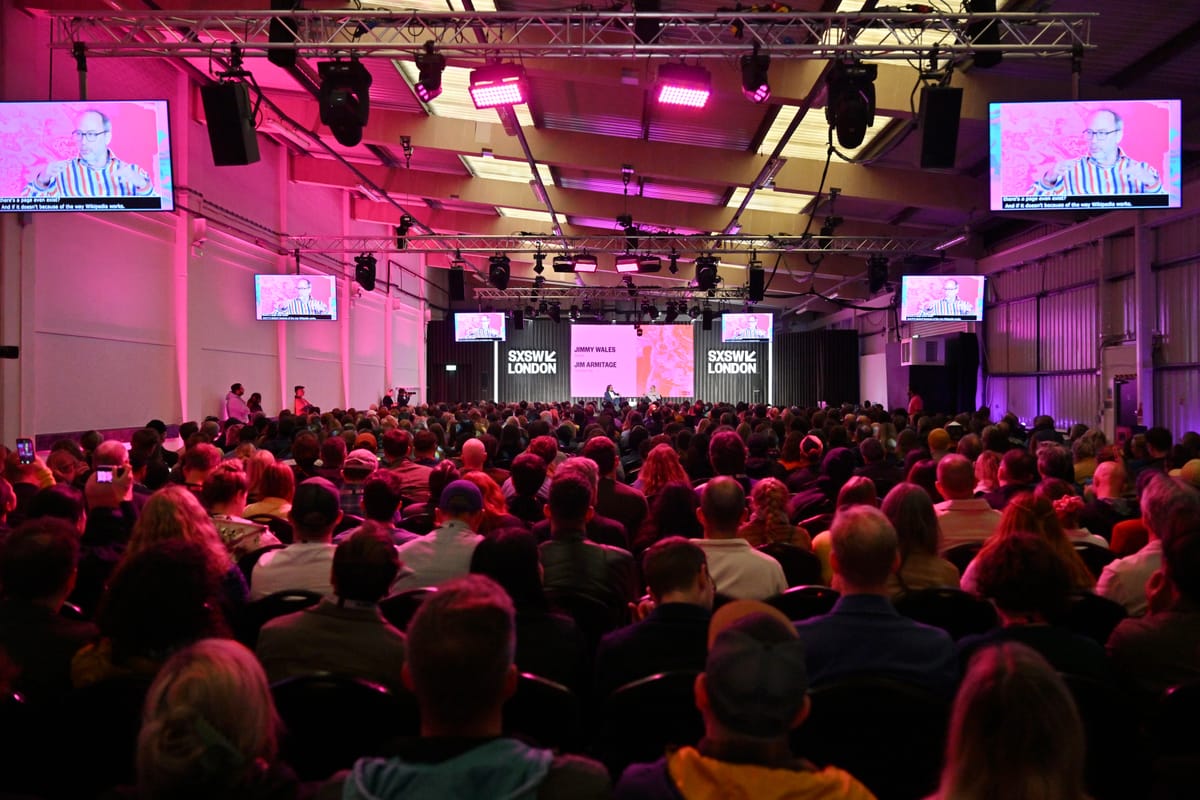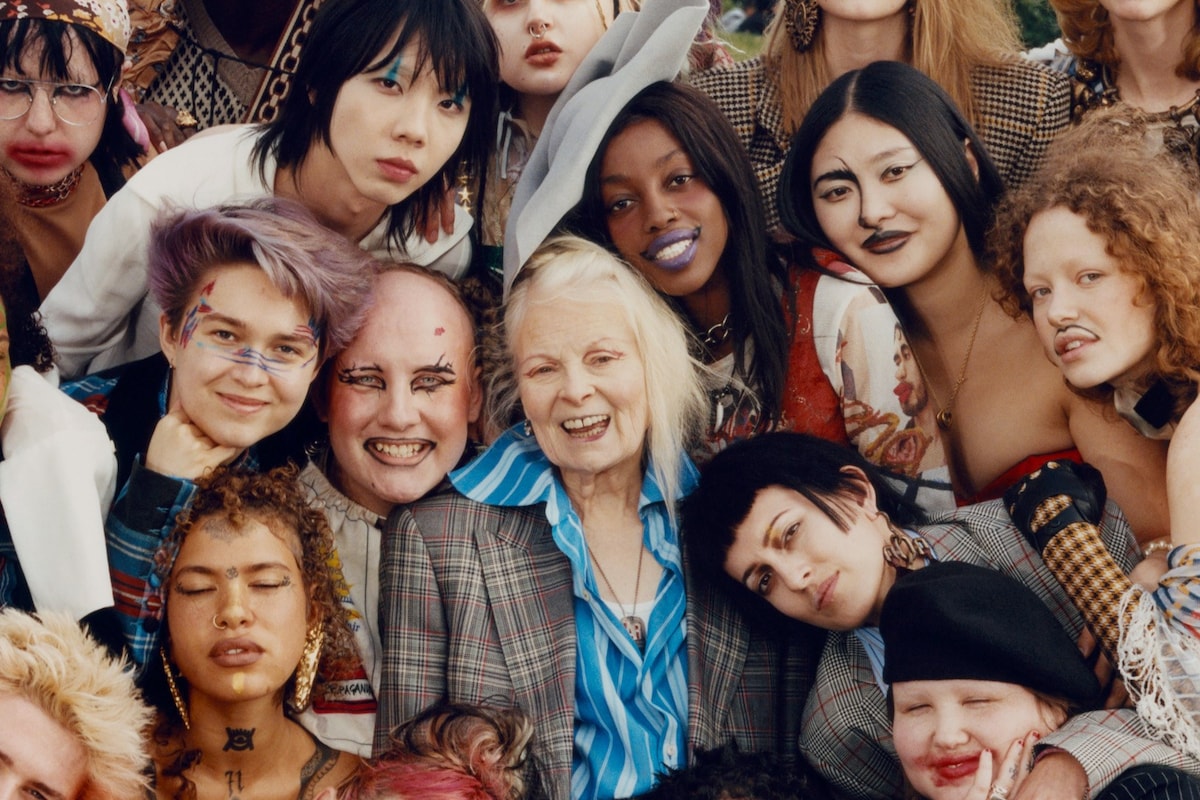5 Takeaways from SXSW London: what was it all about?

South by Southwest festival (SXSW) has been held annually in Austin since 1987. It is a Silicon-Valley-meets-Coachella-style week-long crush – with techno-utopian keynotes by day and superstar music acts by night. It’s the type of place where you can see The Black Keys and also be pitched the future of lethal AI drones (although SXSW were forced to cut ties with the US Army and defence contractors last year after pro-Palestinian backlash).
The organisers have started experimenting with franchising, first in Sydney and now London. As anyone familiar with franchises will tell you, there is always a risk of brand image blowback if the quality of the product falls. The Dazed Studio and ICR teams spent all week navigating the 200+ panels, concerts and exhibitions; so you don’t have to. The much-hyped event set itself the ambitious task of presenting hopeful visions of the future – trying to carve out a unique identity while simultaneously responding to its Texan heritage.
Here are five key takeaways from the week:
#1: Being entertaining does actually pay off for brands
A long-running debate within luxury fashion is whether brand-as-entertainment enhances engagement or cheapens the product. In 2023, Demna described how “fashion has become a kind of entertainment”, summarising Balenciaga’s strategy of pop culture social-first gimmicks under his creative directorship.
In their session, Small World presented concrete data to back up the idea that being entertaining really pays off. Of the top 38 most entertaining brands identified by their Entertainment Index, "97% of them grew in revenue in the last year.” More than that, “Two thirds had double-digit growth." This demonstrates a clear link between entertainment and commercial success.
Before you turn your company into a broadcast network, the data comes with some caveats and context. It has never been easier to ignore brands, which means those that do focus on entertainment as a comms strategy are up against stiff competition – not just with their competitors but with the entire internet. It’s a battle royale for consumer attention, in which all forms of media and all types of entities on those platforms compete with each other simultaneously. Unsurprisingly perhaps, the cost of customer acquisition has tripled; because brands “have been starving their brand image in the interest of short-term tactics." Advertising has become 222% more expensive for the same slice of reach due to increased content and competition.
#2: Artificial General Intelligence is five years away
Google DeepMind cofounder Demis Hassabis spoke about the future of Artificial General Intelligence (surpassing human-level intelligence). His initial pitch of DeepMind to investors was: "Step one, solve intelligence. Step two, use it to solve everything else." Now that vision is getting close to reality. After half a decade of rapid advancements, Hassabis estimates that AGI is "about 5 to 10 years away," a period he considers "very short" given the potential impact, which will be "nothing short of a new industrial revolution, maybe even bigger than that."
It remains to be seen whether his vision of the coming “AI utopia” – which he defines as “radical abundance”, unthinkable scientific and medical advancement, and a flourishing of new artforms and practices – is compatible with Google’s corporate mission.
#3: Young men are spending too much time alone
“As men lose relative privilege, equality feels like oppression to some – fueling resentment.”
- John Burn-Murdoch
John Burn-Murdoch is the Financial Times’ chief data reporter. His SXSW keynote built upon work from 2024 and was simply titled “Women are Outpacing Men”. This is true for most Western nations, as well as other parts of the world. In the UK, the advance of women begins even before nursery, but accelerates through high school and university. Young women are outperforming young men across education and early career.
The effect of attending university affects relationships, career paths and partnership dynamics. So as more women enter university than men (roughly 4:3 ratio) this is creating a graduate mismatch, contributing to a rise in single, educated women. Unsurprisingly, family formation and birthrate declines follow.
The mismatch in academic performance is also behind a divergence in ideology by gender: young women are getting more liberal while young men are getting more conservative. In fact:
“Young men under 25 are now typically more sexist than older men over 55.”
This ideological split is new and historically unusual, especially the role of young people driving a conservative male backlash. Burn-Murdoch speculated that sustained underperformance in academia and early career could be one of the drivers behind young men spending so much time alone. Indeed, young men (18–24) are the most isolated of any demographic, even men older than 55. They are not socialising in mixed-gender settings and this isolation, disconnection, loneliness leaves them vulnerable to the “manosphere”.
#4: Branded AI chats are the new corporate merch
Even Deepak Chopra – the new age guru and alternative medicine magnate – has his own GPT. It is dedicated to “raising consciousness” and “choosing a Wellbeing Path”. In conversation with Dazed founder Jefferson Hack, Chopra expounded on his view that reality is not perceivable through the senses (taste, smell, sight, touch, or sound). Rather, consciousness is the only real "thing" because it enables all other experiences. The universe doesn’t exist objectively outside consciousness; it is a shared hallucination projected by interconnected conscious agents. Somehow this became an argument that materialism is obsolete and a reflection that Sam Altman is an excellent meditator. Deepak sported Balenciaga trainers, full look Issey Miyake Pleats and YSL eyewear.
Scepticism about Chopra’s philosophy aside, the deepakchopra.ai project is entirely indicative of a general trend. There has been an explosion in bespoke or data-trained GPT agents. The sheer volume of reskinned OpenAI interfaces means differentiation in this space is hard: they all look the same, and many produce extremely similar answers.
Brands are undoubtedly keen to integrate AI and appear cutting-edge, but many new machine learning projects are answers in search of questions: they feel like they exist because they can, not because they should; they don’t really solve anything and make your workflow more fragmented and complex to navigate. Slapping a logo onto a tweaked open-source model feels like a modern version of the branded click pen, stress ball or paperweight: corporate merch that is indistinguishable, unremarkable and unnecessary. The use case for AI as part of brand image remains an open question.
#5: Wikipedia doesn’t make things up
In talking about the future of tech, Wikipedia founder Jimmy Wales argued that his site’s radical transparency and collaborative framework is the opposite of AI. Where humans might be fallible, they very rarely outright make up information (and Wikipedia has guardrails in place to spot this when it does happen). By contrast, AI tends to “make things up that are always plausible” – including non-existent book codes or fake website URLs. While Wikipedians are good at spotting old-fashioned fake news, AI's believable falsehoods pose a new challenge.
Wales argued that truth and neutrality are paramount in the age of digital information and that Wikipedia is "philosophically the opposite of this idea that facts don't matter and we can just make stuff up". However he pushed back on Elon Musk’s branding of “Wokipedia”, stressing the need for diverse, thoughtful and kind contributors from all political viewpoints to ensure intellectual diversity "If we don't have a diversity of participants then we don't have a diversity of knowledge". Ultimately the aim of Wikipedia is to help users "understand the facts so you can make up your own mind about what political stance you take".
Top Talks
With more than 200 events, we pulled together highlights from our team’s top sessions. You can find them all in this external Google Doc. Titles and speakers are listed below.
- AI and the future of mobility: Alex Kendall, founder of Wayve
- What is Reality: Deepak Chopra in conversation with Jefferson Hack
- Building Trust in the Age of Information Overload: Jimmy Wales
- Women are Outpacing Men: John Burn-Murdoch (FT) and Juliet Riddell (FT)
- Reclaiming English Identity from the Culture Wars: Caroline Lucas
- The Future of AI: with Google Deepmind cofounder Demis Hassabis
- Entertain or Die: The Imperative for Brands to Become Media Moguls
- Truth, Power and the Press: Tina Brown







